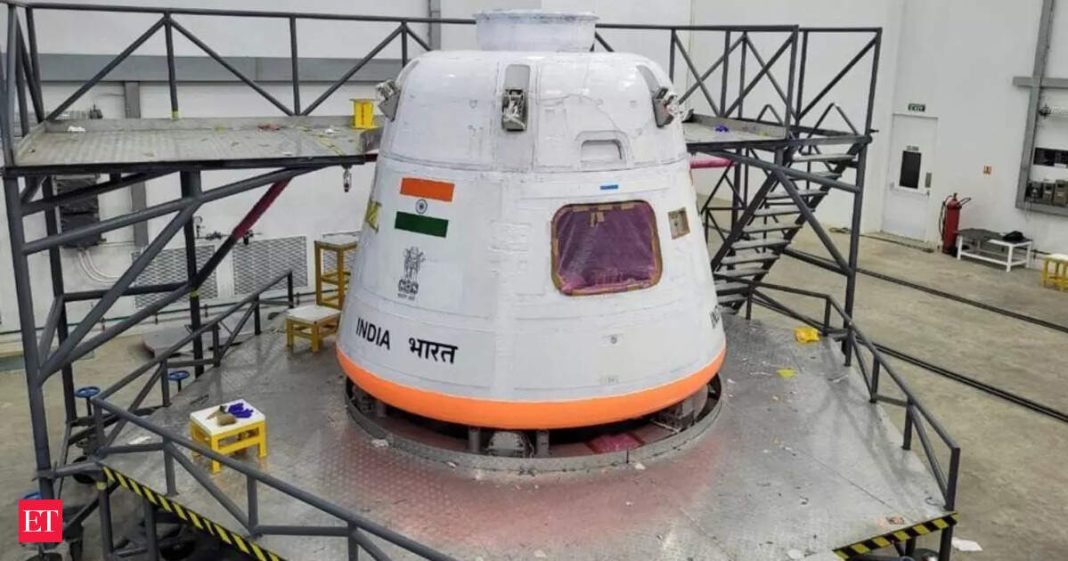Key Takeaways
- India’s Gaganyaan mission represents a “Sputnik moment” for global space leadership
- Astronauts demand India’s seat at the table for shaping new space governance rules
- ESA and ISpA sign collaboration agreement for joint space research
- India’s first human spaceflight scheduled for early 2027 with four designated astronauts
India must take a defining role in shaping global space governance, declared astronaut designates Group Captain P B Nair and Group Captain Angad Pratap at the India International Space Conclave 2025. They emphasized that the Gaganyaan mission represents India’s “Sputnik moment” – a breakthrough comparable to the 1957 Soviet achievement that sparked the space race.
Securing India’s Place in Space Governance
Speaking at the event organized by the Indian Space Association (ISpA), Nair stressed that having Indian representation in space is crucial as international space laws are rewritten. “We missed the nuclear high table. We missed the UN Security Council high table. This time, when the new laws for space are written, we must be at the high table,” he asserted.
Nair argued that India’s space presence would embed values of inclusion, equity and global cooperation. “We have always been in space – we were so far ahead that we relaxed to let the world catch up. Now we must reintegrate our value systems and Indian knowledge into our space journey,” he added.
Government Backing and Industry Readiness
Astronaut designate Angad Pratap highlighted India’s clear space objectives backed by substantial government support. The additional ₹20,000 crore budget for Gaganyaan and the proposed Bharatiya Antariksha Station demonstrate this commitment.
“The industry partners have built space for India for five decades without maximizing profits. Today, we’re at an inflexion point where those investments will yield dividends,” Pratap stated. He noted that human spaceflight extends beyond orbital missions to include microgravity research and future space tourism.
International Collaboration Advances
The conclave concluded with strong emphasis on global cooperation, drawing over 1,000 participants including astronaut designates, ISRO leaders, foreign dignitaries and startup founders.
In a significant development, the European Space Agency (ESA) and ISpA signed a Letter of Intent to enhance collaboration and knowledge-sharing, paving the way for joint research and commercial partnerships.
Global South Representation
Former Minister of State for External Affairs Meenakshi Lekhi, the chief guest, emphasized India’s role representing the Global South. She stressed the need to prevent outer space from becoming dominated by select nations. “We are the originals when it comes to conquering space. If India does well, the world does well,” she stated.
Competence Over Claims
Former ISRO chairman A S Kiran Kumar emphasized that demonstrated capability – not mere claims – earns global recognition. “You will be part of the dialogue on space governance only if you demonstrate capability,” he affirmed.
The event also featured the release of a report on In-Space Servicing, Assembly and Manufacturing (ISAM) and its role in orbital sustainability and the new space economy.
India’s Historic Spaceflight Timeline
India prepares for its inaugural human spaceflight in early 2027, with ISRO planning to send two astronauts to low-earth orbit for several days. The four designated astronauts are:
- Gp. Capt. Prasanth Balakrishnan Nair
- Gp. Capt. Ajit Krishnan
- Gp. Capt. Angad Pratap
- Wing Commander Shubhanshu Shukla
Wing Commander Shukla, 39, recently became the first Indian to board the International Space Station during July’s Axiom-4 mission – making him only the second Indian in space after Rakesh Sharma’s historic 1984 flight.
Science and Technology Minister Jitendra Singh, who inaugurated the conclave, confirmed India’s emergence as a preferred destination for global space investment and collaboration.




